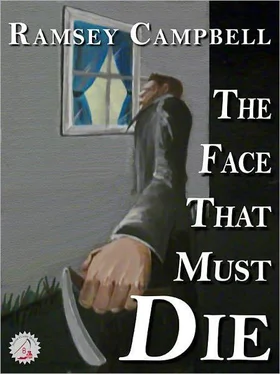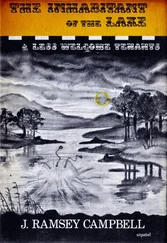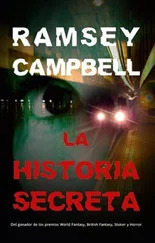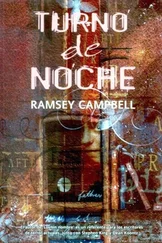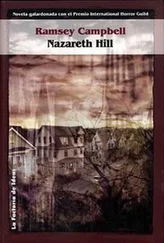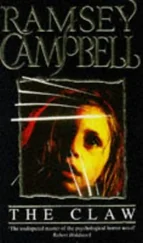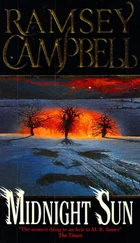Ramsey Campbell - The Face That Must Die
Здесь есть возможность читать онлайн «Ramsey Campbell - The Face That Must Die» весь текст электронной книги совершенно бесплатно (целиком полную версию без сокращений). В некоторых случаях можно слушать аудио, скачать через торрент в формате fb2 и присутствует краткое содержание. Жанр: Триллер, на английском языке. Описание произведения, (предисловие) а так же отзывы посетителей доступны на портале библиотеки ЛибКат.
- Название:The Face That Must Die
- Автор:
- Жанр:
- Год:неизвестен
- ISBN:нет данных
- Рейтинг книги:4 / 5. Голосов: 1
-
Избранное:Добавить в избранное
- Отзывы:
-
Ваша оценка:
- 80
- 1
- 2
- 3
- 4
- 5
The Face That Must Die: краткое содержание, описание и аннотация
Предлагаем к чтению аннотацию, описание, краткое содержание или предисловие (зависит от того, что написал сам автор книги «The Face That Must Die»). Если вы не нашли необходимую информацию о книге — напишите в комментариях, мы постараемся отыскать её.
The Face That Must Die — читать онлайн бесплатно полную книгу (весь текст) целиком
Ниже представлен текст книги, разбитый по страницам. Система сохранения места последней прочитанной страницы, позволяет с удобством читать онлайн бесплатно книгу «The Face That Must Die», без необходимости каждый раз заново искать на чём Вы остановились. Поставьте закладку, и сможете в любой момент перейти на страницу, на которой закончили чтение.
Интервал:
Закладка:
“ So do I,” Craig had said, smiling with profound relief.
The peace which they’d experienced together then had been the seed of their relationship. Not long afterwards, Paul had moved into Craig’s flat. For months Craig had felt stable, calm, invulnerable – at least, as much so as he ever had.
Paul had been a plasterer. Once, when he’d worked on Craig’s bathroom wall, Craig had watched him: his complete involvement in his skill, his graceful deftness, the economy of his craftsmanship. Craig had thought he’d never seen greater artistry.
But Paul’s work had separated them. He had never wanted his workmates to come to the flat. When he went drinking with them, which was often, he had never invited Craig. It hadn’t mattered to Craig – but it had troubled Paul, who had stayed out drinking more frequently, sometimes not returning to Craig the same night.
One midnight he’d tramped in, punching the wall to steady himself. “I can’t stand this.” His voice had been drunkenly menacing. “I’m going back home.” He’d dragged his suitcases about, shoving Craig away, and had thumped downstairs with the suitcases full, to yell for a taxi.
Craig had moved to Aigburth Drive, to forget. He didn’t need sex, it involved too much pain and loss, it made him too vulnerable. He was content to stay within himself. He had a few close friends who shared his tastes in music. He liked his colleagues well enough, though their only notion of art seemed to be films, which he thought vulgar and sensational: he hadn’t been to a cinema for ten years. His work was demanding and sometimes unpleasant, but bearable. He was able to sleep at night.
Then the police had visited his flat.
At first, despite the initial shock, their visit hadn’t disturbed him. He could tell that they knew he was gay, but they seemed to accept that without censuring him. When they had satisfied themselves that he wasn’t the man they were hunting, they’d told him of the anonymous call.
No, he’d told them when he could speak: he had no enemies that he knew of. His mind was calling him a liar. It must be someone in the house: who else could have a motive?
He hadn’t needed the menacing calls to confirm his fears. Those calls had depressed him so much he hadn’t reported them to the police. It didn’t matter who had been calling: weighed down by distress, he couldn’t yearn for revenge. Even his thick curtains couldn’t help him sleep. It wouldn’t take many more calls to make him leave this flat.
The phone rang.
He started. One buttonhole of his jacket gaped while his fingers wrenched convulsively at the button. His heart scurried, his breath began to wheeze. The second movement of the Beethoven ended with an abrupt forte chord, isolating the shrill bell. Was it his tormentor calling? He lifted the pickup arm gently from between movements, slowly enough that before he could reach the phone, it fell silent.
But this was dreadful. He was afraid to answer his own phone. He couldn’t feel safe even in his flat. At work stray remarks made him feel insecure. “The queers are better off now they can be treated medically.”
“ They’d be all right if they left children alone” (as if all heteros did!). Even his colleagues who liked to think themselves tolerant made a joke of gay ads in the newspapers, as though nobody listening could possibly be gay. They were like Peter Gardner upstairs – his generation was supposed to be tolerant, yet he always stood away from Craig as though he might catch something. Fanny across the landing was one of the few with whom Craig could be open without fearing they would think he was making a pass.
Not that he cared for all homosexuals. He disliked the flamboyant gays; they lacked taste and discretion. He disliked the empty cleverness of others, their nervous brittle wit and ostentatious culture. Men who wept in public, even over the deaths of friends, embarrassed him. It was all so simple: he belonged nowhere.
He played the slow movement of the Beethoven as he finished dressing. No other music moved him so profoundly: its calm, its plaintive sweetness that achieved resignation. Often he felt that it contained all that Beethoven had wanted to say when he had known he was dying.
The music calmed him, to an extent. Perhaps after all he might meet someone tonight. He didn’t insist on a real man, whatever that was, as some did; he simply wanted someone who would make him feel peaceful.
He glimpsed himself in the mirror. Who would bother with that wheezing middle-aged bag, who didn’t know himself what he wanted to be? No doubt he’d spend the evening vying with the others in hollow wit. He had nowhere else to go; there were no concerts tonight. He sleeved the Beethoven, and checked automatically that the records were in order in their cabinet.
The landing was chill. He was glad of his thick overcoat; it promised to be a cold night. He poked the time-switch, then ducked back into his flat to confirm that the lights were out before he closed the door. His breath rasped as he hurried resoundingly downstairs.
The light clicked off just as he reached the hall, which allowed him to see someone’s silhouette on the glass of the front door. He heard a key scrabbling; it sounded clumsy as a dog’s claws. He strode to open the door for whoever it was.
Even when he opened it, the man in the porch remained little more than a silhouette. Craig stepped back a pace to let him enter, but the man stood, neither advancing nor moving aside. Though he was within arm’s reach, Craig could make out nothing of his face. All he could distinguish was that the man’s right hand had plunged into his coat pocket.
Craig paced forward. The cold that seeped into the porch seized him. Surely this man didn’t live here. Why should he have a key? The calls had made Craig nervous. “What do you want?” he demanded more sharply than he’d intended.
He heard a faint click, and the man’s right hand made a violent lunge towards his face.
For a moment the gesture seemed to have offered more violence than it had achieved. Something had flashed beneath Craig’s eyes, but hadn’t touched him. His throat was very cold. As he recoiled, his hand moved instinctively to draw his collar shut.
Then he realised that he couldn’t swallow. His neck felt unfamiliar, no longer merely cold. Good God, the man had attacked him – he’d whipped him across the windpipe with a piece of metal; that must be the source of this rapidly growing ache.
Only when his fingers touched his neck did he realise that the man had cut his throat.
Chapter XII
Horridge felt so confident that he made the first call from Cantril Farm. Craig was either not at home or lurking. Horridge made his way to the bus stop. Even the unlit walks, overlooked by blinded neon lamps, hardly bothered him now that he could defend himself.
The bus was crowded with young couples, dressed with what passed for smartness these days: they looked cheap to him. No doubt they were all off to get drunk. Let them waste their time if that was all they cared about. Some people had more important things to do.
The notice made him uncomfortable. He’d slipped it down the front of his trousers, having nowhere else to hide it. But the discomfort was worthwhile. This time he would get through to Craig. He had some bits of clay to attach to the notice; that would convince Craig it was the painter’s work. Either he would betray himself by accusing her, or this new distrust would be unbearable.
If only Horridge were able to confront him directly! He found these underhand methods slightly disturbing. Anything was justified under the circumstances. He hurried along Lodge Lane, past gateposts that led to mud which sprouted litter, towards Aigburth Drive.
Читать дальшеИнтервал:
Закладка:
Похожие книги на «The Face That Must Die»
Представляем Вашему вниманию похожие книги на «The Face That Must Die» списком для выбора. Мы отобрали схожую по названию и смыслу литературу в надежде предоставить читателям больше вариантов отыскать новые, интересные, ещё непрочитанные произведения.
Обсуждение, отзывы о книге «The Face That Must Die» и просто собственные мнения читателей. Оставьте ваши комментарии, напишите, что Вы думаете о произведении, его смысле или главных героях. Укажите что конкретно понравилось, а что нет, и почему Вы так считаете.
